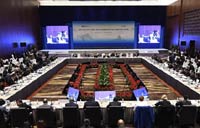
APEC's impetus lies in reshaping
Updated: 2014-11-07 16:34
(Xinhua)
|
||||||||||
 |
| Anti-graft statement expected from APEC |
 |
| Free trade deal beneficial to APEC |
The Asia-Pacific Economic Cooperation (APEC), a platform that groups the world's largest and fast-growing economies, should play a pivotal role in regional sustained growth as the shadow of world economic slowdown lingers on.
It is time for the organization to take initiatives to reshape its framework and release more energy of regional economies.
Looking back, as the European countries in the 1990s were aiming for a highly integrated community, say, the European Union, the Pacific Rim economies could but set up a loosely-organized forum to push for regional integration.
The APEC, in the eyes of some people, is but a forum with a basket of non-obligatory declarations, initiatives and roadmaps, and it is a regional arrangement born to be a compromise for economically unequal Pacific Rim members.
This is because the organization is a mix of both the richest countries and the poorest ones; of both the most populous continent and the sparsely populated islands; and of both the countries on the wheels and the tribes on the trees.
The incredibly unbalanced economic structure resulted in a seemingly makeshift arrangement rather than a strict trade arrangement like the EU.
Now, as the financially mired European Union is striving to mend its system, the Asia Pacific's wisdom has begun to pay off. Recovery in the wake of economic slowdown is picking up in the Pacific Rim, though not that solid yet.
However, a gradual, flexible way in regional integration is not tantamount to a "talk only" tactics or even playing the closed-door "club politics."
Since the Doha Round has stalled, a variety of bilateral or multilateral trade arrangements propped up. Compared with a unified regional cooperative agenda, however, they're rather fragmented.
Some economies even tend to turn the open dialogue on free trade into a club that requires "access card" to better fit their own calculations, which is harmful to the regional sustained growth, especially for developing economies.
Now, China has proposed the study of establishing the Free Trade Area for Asia Pacific (FTAAP), a centerpiece among the APEC's initiatives to create a broadly representative cooperative mechanism.
The proposal is a promise for the shared prosperity for all the APEC members, and the path to it remains the open, pragmatic and inclusive approach by which the organization has made headway over the past 25 years.
Also, an innovative cooperation concept shall be translated into the APEC framework to keep it in pace with the change of the world industry landscape.








